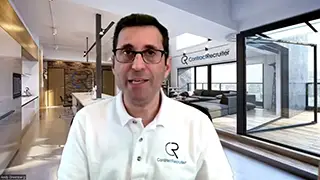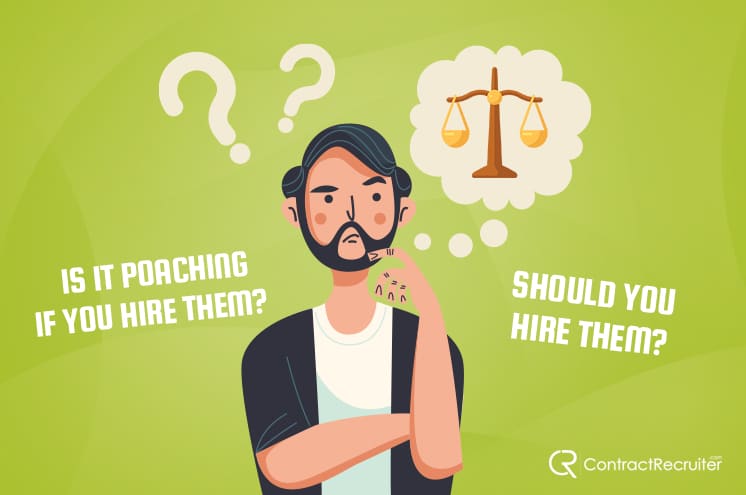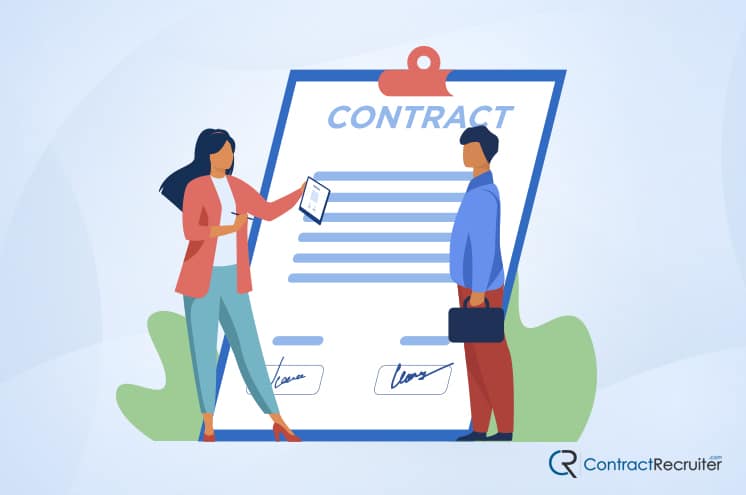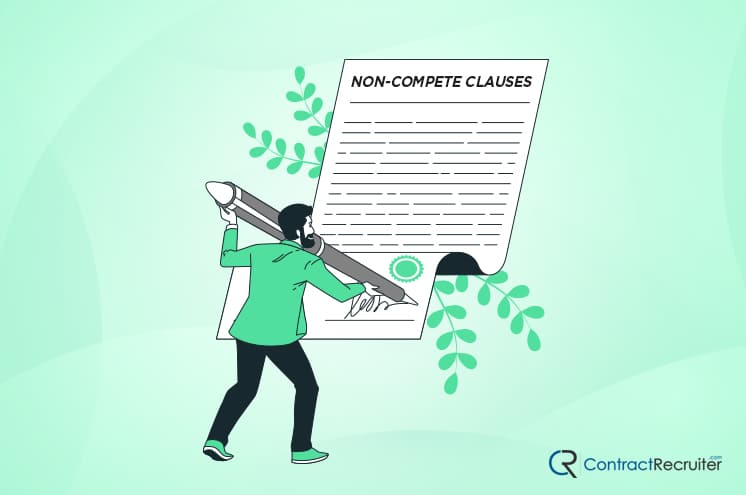Every company has its superstar employees. Maybe it’s your sales team manager who has enabled growing sales year after year, or perhaps it’s an executive who has been responsible for growth in several companies. Maybe it’s a star developer who streamlines your entire workflow.
Whoever it is, you want to keep them around. At the same time, your competitors want rockstar employees on their team as well. You want to build up your team too, and maybe you’re eyeing the most outstanding employees your competitors have on staff.
Do you make a move? Do they?
What is Employee Poaching?
What we’re talking about here is poaching employees. When you scout a high-skill, high-value employee on a competitor’s staff, you might be tempted to reach out to them. Maybe you call them, perhaps you hire a recruiter to get in touch with them, or maybe you reach out to them on LinkedIn. You get a feel for how attached they are to their current job and consider giving them an offer – usually a better offer – than what they’re currently doing.
If they bite, they jump ship, and you’ve successfully poached an employee from your competition. Of course, if your pay and benefits package isn’t sufficient, your competitors may be able to poach all of your best employees right back.
Employee poaching can be individuals, or it can be entire teams. It’s not uncommon for a team leader to want to bring the team they’ve worked with and grown rapport with along for the ride. The company hiring them gains a considerable asset, but the company losing them suffers a significant loss.
Poaching can happen at all levels of a business, but it tends to happen most often and most visibly at the managerial or executive levels. The higher the skill and knowledge level necessary to perform a role, the more likely poaching is to be effective since the potential pool of candidates is much smaller. This phenomenon is also why you see the same names crop up in the news related to major corporations, which seem to swap C-levels and executives all the time, but rarely bring in new people.
Is Poaching Employees Illegal?
Let’s consider a situation.
You’re looking for an upper-level HR manager. You’ve posted your job on your organization’s careers page, and you have a team of experienced recruiters looking for the best candidate. You get a bite; a talented and experienced HR manager interested in your company and your benefits package. That HR manager applies for an interview, and you soon discover that your biggest competitor currently employs them.
Is it poaching if you hire them?
Does it matter if they came to you or you came to them? Did the recruiter cold-call them based on their LinkedIn profile, or were they already seeking a new job and happened to find your opening?
Should you hire them?
Technically, yes, this is poaching. However, it’s also the natural way of things for some roles. People who work a particular role in a company will build up skills and experience related to that role, and when they want to move on, they will look for similar positions in other companies.
If “poaching” were illegal, it would be impossible for anyone to move from one company to another while still working in the same field. After all, there would be little way to determine whether the employee left of their own volition or if they were poached, and a sufficiently litigious company could try to punish any employee who leaves.
Here’s another thing to consider. In 2010, there was an investigation in Silicon Valley. Six major tech companies – Apple, Google, Pixar, Intuit, Adobe, and Intel – had an agreement between them. That agreement was that they would not poach each others’ employees. They would, at least, refrain from contacting one another to poach employees.
If an employee wanted to leave Google and work for Pixar, could they? Well, Pixar could have refused to hire them based on this agreement. This situation led to a Department of Justice investigation, which ordered these companies to cease this agreement. Poaching is not only not illegal, but it’s also encouraged: the anti-poaching agreement, the DoJ decided, constituted an anti-trust and anti-competitive agreement. You can find the complete statement here.
“The department said that the agreements eliminated a significant form of competition to attract highly skilled employees, and overall diminished competition to the detriment of affected employees who were likely deprived of competitively important information and access to better job opportunities.”
The fact is, at least on a federal level, poaching employees is not illegal.
Are There State-Level Regulations on Poaching?
There’s another level to consider, and that’s the state level. Specifically, you may encounter Tortious Interference with a Business Relationship or Contract.
What does that mean?
Any time you form an agreement with another party – whether it’s a distributor, a wholesaler, or an employee – you do not expect a third party to try to interfere with that relationship. If outside interference removes that contract and does financial damage, you may be able to pursue a tort claim for that interference.
In some interpretations, this can include the employee contract and hiring decision. If you’re hiring an employee, but a competitor interferes and engages them instead, do you have significant enough damages to take the competitor to court?
The truth is, while you may be able to pursue damages in court for a single employee, it’s generally not significant enough to be worthwhile. Tortious interference most often applies to substantial contracts with retailers, distributors, and other businesses, not individual employees. That said, these regulations vary from state to state, and it may be worthwhile talking to a lawyer if your employees are consistently poached from you by a specific competitor.
“State law varies, but you may be on the hook for tortious interference if your employee poaching tactics include wrongful allegations, a blatant disregard for non-compete agreements, or acting illegally.” – Reuters.
Bear in mind that “the competitor has a better offer for an employee” is not a good reason to consider legal action; you can always increase your offer to compete. More often, you need to look for evidence of wrongdoing.
What About Non-Compete Clauses?
Another wall you might encounter with employee poaching is the non-compete clause. A non-compete clause is a clause in an employment contract that says, in essence, “you will not go to work for a direct competitor of our company for at least one year after leaving our roster.”
Or, to quote Workable:
“Non-compete clauses are designed to stop free labor markets from becoming free-for-alls. They encourage transparency within companies and can boost retention rates. But they may stifle wages and impact labor mobility. Regardless of their broader effects on the economy, non-compete agreements are a reality for many employees companies want to hire.”
So, with non-compete clauses in play, where do you stand with poaching employees?
The truth is, many non-compete clauses are not legally enforceable. From Jamal Jackson on LinkedIn:
“States usually look at four different factors to determine if your non-compete agreement is valid. They ask: 1) Is it limited in time?; 2) Is it limited in geographic scope?; 3) Is it limited to a particular industry or activity?; and 4) Does it protect a legitimate business interest?”
In many cases, the non-compete clauses in play do not meet these requirements and are thus considered overly restrictive. If they’re highly restrictive, the companies can’t enforce them. If you choose to poach an employee in violation of a non-compete clause, their former company would need to challenge you in court, where a judge could then strike down their non-compete clause entirely.
You may or may not decide this is worth the risk. Sometimes, a non-compete clause is well-formed and will pass legal scrutiny, in which case you (or your new employee) can be liable for the violation of that contract.
Often, companies will avoid looking at direct competitors for passive candidates specifically to prevent running into non-compete clauses. Recruiting for a given role outside of your immediate surroundings tends to work better.
What Are The Ethics of Poaching Employees?
Now, what about the ethical concerns of poaching employees? Is it unethical, or is it impolite?
The truth is, it’s all relative. There’s no single cut-and-dry answer to this question.
If your company works closely with other companies in the same general niche, you might not want to poach employees to avoid straining business relationships. On the other hand, if you work closely with competitors, you may find that trading employees can benefit both sides. Then again, working too closely with competitors might bring up anti-trust laws violations, which isn’t in anybody’s best interest.
Poaching tends to be unethical at its worst, specifically when you’re poaching with malicious intent. Say, for example, you have a competitor growing a solid market share in your niche. You’re finding it difficult to compete with them for consumer preference, marketing budget, or product quality. So, instead, you hit them where it hurts. You identify and strive to poach all of their best employees. They are left with a hampered team and will be much less able to compete at the same scale. This strategy can devastate a company and is also quite unethical.
Are There Issues With Trade Secrets?
Another issue that might come up, particularly for innovative, cutting-edge companies, startups, and tech companies, is trade secrets.
Companies like Apple and Google might want to run non-compete clauses precisely so that their competitors don’t hire their employees and get those employees to spill the beans on internal processes, new technologies, or other trade secrets. Pepsi wouldn’t be able to hire former employees of Coca-Cola to learn the recipe for their cola, after all.
The truth is, while companies often use non-compete clauses to try to combat this, they tend to be difficult or impossible to enforce. Instead, a company should include a non-disclosure agreement to protect the intellectual property of the company.
Of course, sufficiently large companies often get around this by buying the whole company outright. Google is known in the tech industry for buying up tech companies with innovative apps and rolling those apps into Google services (see this entire list for an example).
Is this practice more or less ethical? Who can say?
Should You Poach Employees from Your Competitors?
All of this leaves you asking one key question: should you poach employees?
The answer varies.
You can often poach employees with no risk to yourself or your business, so long as there are no valid non-compete agreements in place. Whether passive candidates or active job seekers, employees will look for new roles with companies they recognize. Often, it’s challenging to get far enough outside of your sphere of influence for some hiring practices not to be considered poaching.
While some state laws and regulations might put a damper on poaching, the vast majority of the time, they will take no legal action. Neither company is likely to pursue legal action over a single employee. Poaching typically only becomes a problem when one company embarks on a dedicated campaign to destroy a competitor by poaching all of its top talents.
At the root of it all is the employee. The employee wants what is best for themselves and their family, which means working for the company with the best pay, the best benefits, the best work/life balance, the best culture, the best commute, and so forth. Thus, if a competitor wants to retain their best employees, they need to offer the best and most competitive pay and benefits. If you’re going to poach them, you need to beat their current situation, and that might not always be possible.
So, to wrap up. Is employee poaching illegal? No, though it can run afoul of some state-level contract laws. Is it unethical? Generally no, outside of specific situations or when done with malicious intent. Should you do it? That depends entirely on how well you can fill your staff with talented employees without resorting to poaching in the first place.







